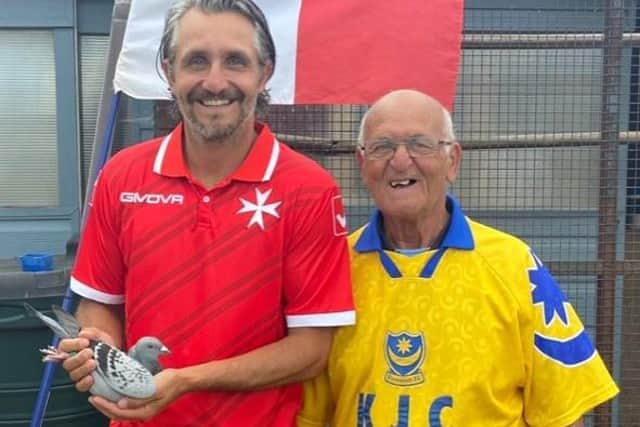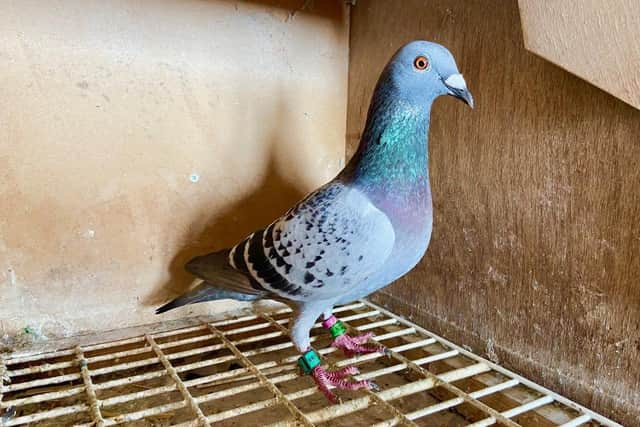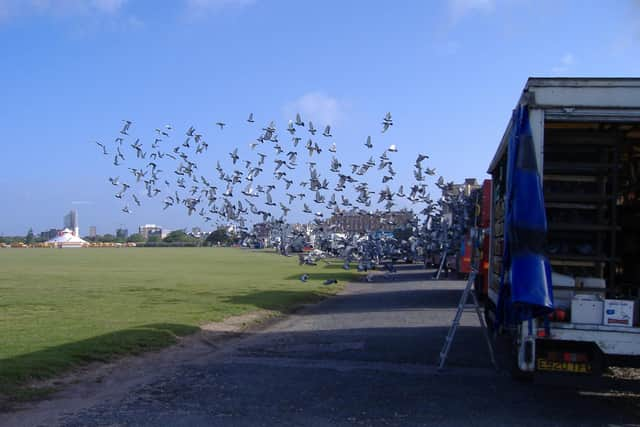No Doubt about it – John and Kevin’s pigeon is an international champion!


Dad John and Kevin Zerafa’s pigeon - No Doubt - defeated over 2,200 other birds belonging to over 340 fanciers nationwide to win first prize in a British International Championship Club race from Bordeaux.
Having been released at 6.40am from the French city at a distance of 408 miles and 798 yards, No Doubt homed at 3.54pm - achieved a winning velocity of 1,297.38 yards per minute for the 9 hour and 14 minute flight home.
Advertisement
Hide AdAdvertisement
Hide AdThat produced an average speed of 44 miles per hour for the bird owned by the two members of the Portsmouth-based Milton Homing Society.


As with all their fellow members of the Society, John and Kevin race their pigeons back to their own back garden - in their case a large rear garden with a big pigeon loft.
As with all other sporting activities, pigeon racing was put on hold due to the pandemic back in March.
But fortunately, due to its unique individual nature of the competition whereby the pigeons race back to their own homes, it was one of the first outdoor competitive sporting activities allowed to resume on June 1.
Advertisement
Hide AdAdvertisement
Hide AdThis enabled Society members to start racing, a massive boost for their mental health given the majority - including John - were either in the vulnerable or shielded categories.


The Society has been in existence for over 90 years, and has been based at the Old House at Home pub for decades.
The first recorded National Flying Club winner in Portsmouth was G.W.Scadden in 1912.
George Stubbs, of Farlington, was prominent in international races in the 1930s - achieving fourth place in an international race from Barcelona, of over 670 miles, in 1931.
Advertisement
Hide AdAdvertisement
Hide AdSociety members generally race their birds in races belonging to one of two federations.
The Solent Federation mainly races in the south of England and into France, while theSouthampton & District North Road Federation races to the north of England, generally Yorkshire.
Locally, pigeons used to be released - or liberated, as Society members would say - on Southsea Common after being transported there via an army of lorries. But the sight of thousands of birds all flying off at once has not been seen in the city for several years.
Mick Johnson, secretary of the Milton Homing Society, is delighted that his club’s members have been enjoying their sport again since early June.
Advertisement
Hide AdAdvertisement
Hide Ad‘It’s been great for our members who have been shielding,’ he said. ‘They have been able to stay at home but still take part in the races.
‘All they have to do is leave their birds outside their house, someone will pick them up and take them where they need to go.
‘It’s a sport that’s made for social distancing really, it’s very individual and there’s no spectators.
‘We missed about six weeks of our season, but apart from that it’s affected us a lot less than some other sports.’
Advertisement
Hide AdAdvertisement
Hide AdJohnson admits that pigeon racing’s peaked in popularity a long time ago, and fears for its long-term future.
It is believed there are around 30,000 people involved in the sport in the UK currently.
‘In the 20s and 30s it was very much a sport of the hierarchy - MPs, solicitors, doctors,’ he explained.
‘After the war it became more of a working man’s sport as people had more time and money.
‘I’d say the sport’s heydays were in the 50s and 60s.
Advertisement
Hide AdAdvertisement
Hide Ad‘Today’s kids aren’t interested - they’re all electronically minded these days. They haven’t got the commitment needed - they just want to pick something up and put it down again
‘Back in the 50s and 60s people just took part as a hobby. But now there seems to be a more serious aspect.
‘There’s fewer people involved, but it’s more competitive in some regards.’